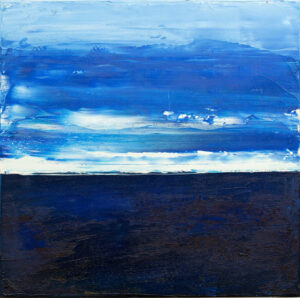 In July 2018 I traveled with Carla Harryman to visit Etel Adnan in Erquy, the beach town in Brittany where she kept an apartment with direct access to the beach, weather, and sunset. Simone Fattal was not present, while Etel was staying with a younger companion and gifted painter, Eugenie Paultre. I cannot locate photos from the period but Eugenie’s painting titled Mer, recalling the view from Etel’s balcony, suggests the drama and strangeness of this coast—while Erquy continues as a mid-tier vacation retreat, with small hotels, flea markets, parking, normative uses of the beach, hang gliding in the distance, strong tides.
In July 2018 I traveled with Carla Harryman to visit Etel Adnan in Erquy, the beach town in Brittany where she kept an apartment with direct access to the beach, weather, and sunset. Simone Fattal was not present, while Etel was staying with a younger companion and gifted painter, Eugenie Paultre. I cannot locate photos from the period but Eugenie’s painting titled Mer, recalling the view from Etel’s balcony, suggests the drama and strangeness of this coast—while Erquy continues as a mid-tier vacation retreat, with small hotels, flea markets, parking, normative uses of the beach, hang gliding in the distance, strong tides.
In 2020 Etel published Shifting the Silence with Nightboat Books; the bio notes state that she continues to live in Paris though the work anticipates her death the next year. In terms of genre, the writing is a hybrid poetic meditation, a sentence-level nonnarrative that records states of being and mind, with the turn to language always present and exact. Time is marked at the level of the sentence, with only the sparest narrative motivation: “My thoughts drip, not unlike the faucet. They don’t let me know what they’re about. Other ones follow, strangers equally. / The daylight is getting dim. We’re not in winter, no, we’re somewhere in early July. The sunset will happen soon. Then it will disappear too” (5–6) Temporality emerges from the writing as a form of roughing out, coloring in, and smoothing over—and along with it rhetoric, perception, memory, affect, comprehension:
You know, sunsets are violently beautiful. I would say that they are so by definition, but there are lights, not even colorful in the habitual sense, lights elemental, mercurial, silvery, sulfurous, copper-made, that make us stop, then lose balance, make us open our arms not knowing what else to do, arrest us as if struck by lightning, a soft lightning, a welcome one. I wait for those lights, I know some of you do too, wherever you are, I mean when you are standing by an ocean, along, within the calmness of your spirit. Be planetary. (17)
“Self keeping record of self’s consciousness, the old yoga of Poesy,” per Allen Ginsberg in Indian Journals (liner notes). Both that earlier moment and Adnan’s text chart a voyage meant to cut through the veil of mere living to the nonpresence of mortality. With Etel, it is the practice of writing, noticing, recording states of being, and making art that comes out of that continuous activity, over a long duration of situated decades and spatial disruptions, that inform each sentence in her prose. The writing is at once retrospective, futural (toward an unknown), and open to the present—which, as it happened, took the contingent form of our visit: “Barrett’s and Carla’s traveling to this place is a central event; it will join the experiences and all the stuff that keeps creating what we call eternity . . . It took a table and few sips of wine to discover the clarity of their profound simplicity” (16–17), followed by the sunset meditation above. The simplicity, of course, must be experiential, which the arrival of two poets in their complex itinerary could only highlight that clarity. That is the relation I want to focus on here.
Several pages, or days hours minutes later (we spent our time visiting daily and being treated to spectacular meals, in small Breton towns and seaports, driven over coast roads by Eugenie), we had a literary afternoon. Part of it was taken up with a short interview framed by a series of prompts from a Wayne State student (“Why is the sun important in your work?”) that has been transcribed and waits for final edits and publication. Then (same day, a day later?) I wanted to show Etel my poem “Plan B,” written in a gale of rage after the 2016 election and since published in Lana Turner. The poem, it may be said, is complex—deliberately so, to the point that it hopes to overwrite and defeat entirely the stupid rhetoric of the nameless person who has not yet gone away. Against Stupidity, it ought to be subtitled, and against also “dumbing it down” a perennial refrain of American culture. How would Etel’s imperative “I need to simplify my thinking,” as an existential task, intersect with the tortured imperative of canceling out stupidity? “He mentioned the ‘turbulence of destiny.’ It was sudden, and it worked” (20).
Etel continues: the poem “suggests that destiny is still manifest, and is in turbulence, and is young, for sure, and among us, not an abstraction, but an active element, destiny as his own [mine?] kind of god.” The commonality of destiny as young I want to especially affirm, at the time in the company of 93-year old Etel, Eugenie the rising artist, and we American poets traveling. And it extends outward as a principle—here, not of hope but of its own order. What is turbulent in history for Etel would begin, of course, with Beirut and its history forcing many removals over a lifetime. I think often of that turbulence continuing in her absence, today, Saturday, I cannot watch the news. At the time I was distracted by the turbulence of deciding about a tattoo, which I pondered at length during our visit. I even think I discussed it with Etel, whose wisdom would not deign to judge. An overdetermined allegory, inscribed on the body, not a principle of hope but to vacillate on while the sun set in Erquy.
Etel’s meditation continues; other friends arrive; there is a return to Paris, and then a four-month case of COVID in its early days (as only 6000 had died in France), which Etel survives in the space of one paragraph: “I also fell ill. A new virus, it seems . . . . It didn’t finish me off, but came close. New pains experienced, unwelcome. It lasted four good months. I still feel shaky, unsure” (72). That adds meaning to the form of a paragraph, not simply emotional as Gertrude Stein would have it, but “destining,” certainly after Heidegger. “I am on a barren planet. Empty spaces, with no vegetation, but with the illusion that I smell thyme” (73). Were an essay to be written on that sentence, it would add to its destiny—through forwarding. “When I reach an edge I see other planets, non-hospitable ones. Then I return to my module, my isolation: I think of the ocean, the steel-colored surface of the Pacific, and of my mountain, and try not to cry” (73). Mt. Tamalpais, Mont Victoire, Mt. Sannine.
My dreams are short: they’re imitating the new wave of videos. Even in dreams we lose concentration. To prove to myself that I’m not quite dead, I reread Barrett Watten’s “Plan B.” In all innocence he can call that piece of thinking a manifesto. A manifesto as stirring as the Manifeste du Surréalisme had been when it appeared in 1924. These texts are territories: you can walk in them, you can drive, or fly over. “Plan B,” among other things, already challenges artificial intelligence. It beats it, because I doubt that artificial intelligence will concern itself with man’s destiny. (52)
I encountered this work not directly but, it now appears, as part of its destining. After Etel’s opening at the Guggenheim, we were to return to Paris and visit—for a Thanksgiving dinner not at home, the day after—but then. We made sure no continuity was broken as part of our trip’s destining. Over the next month I made a translation/adaptation of an early, political long poem by Etel titled The Beirut-Hell Remix (After Etel Adnan). It was guiltily published in a pdf version by the Guggenheim Museum, who would not make good on their invitation to present the work at a high-profile memorial event, attended by fellow poets. This was “turbulence as destiny” in an unusually pure form, to quote André Breton; the poem captures that in Etel’s history. Time passed; I have read and written about the poem; we hope to visit Simone in Paris on the three-year’s anniversary of the occasion. Only recently, scanning the internet for uses of my name, I encountered a blog post by a hostile poetry camp follower somewhere “out there“—not AI, I don’t think—which casts aspersions on Etel for including me, as a notorious miscreant, in her work. This was the first time I had heard of it, so I rushed to order from Amazon Prime. Last night it came and I read it in one sitting. As a form of destining, it arrived, as will I hope also my gratitude to Etel.
Notes and links
Images
Simone Fattal and Etel Adnan, from Hans-Ulrich Obrist, “Etel Adnan and Simone Fattal talk poetry, pottery, and philosophy from their Breton retreat” (July 2021), Art/Basel, online; photo: Louis Canadas.
Eugenie Paultre, Mer #7, n.d.; here.Texts
Etel Adnan. Shifting the Silence (New York: Nightboat Books, 2020); here.
Barrett Watten. The Beirut-Hell Remix (After Etel Adnan) ).” Translation and adaptation of L’Express Beyrouth-Enfer, to accompany exhibition and memorial reading. With note. New York: The Guggenheim Museum, 2022; here.
———. “Plan B.” With note. Lana Turner 12 (Fall 2019): 108–23; here.













